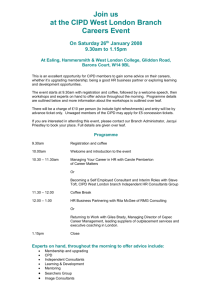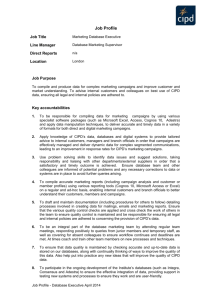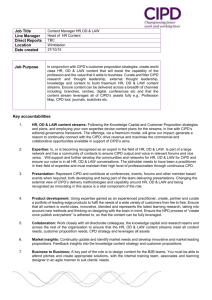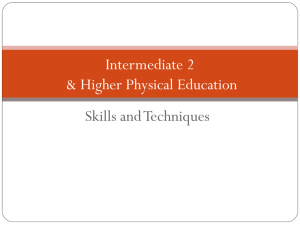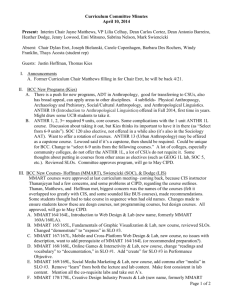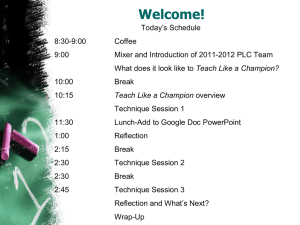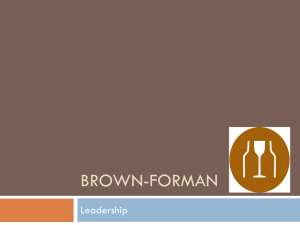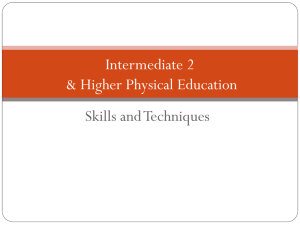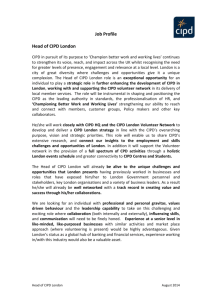HelenFrancis
advertisement
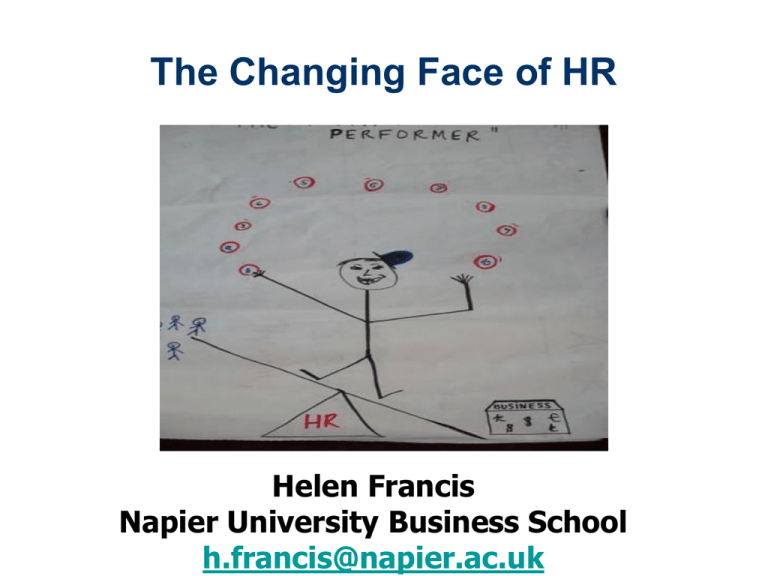
The Changing Face of HR Helen Francis Napier University Business School h.francis@napier.ac.uk Tracing the concept of ‘thinking performer’ into practice • Our study (Helen Francis & Anne Keegan) – Approach (origins of TP), methods and aims • Context of study – Modelling of HR roles & emergence of business partnership • Our preliminary findings & implications for HR practice Origins of ‘Thinking Performer’ • Originates from discussion about the need for a central vision (of an effective practitioner) underpinning CIPD standards. • Two images emerged: ‘reflective practitioner’ and ‘strategic activist’: Emerged from concerns about low level of reflection, and overly operational focus • Someone who ‘makes the move’ to becoming a business partner and (…) ‘is an HR professional who applies a critically thoughtful approach to their own job so as to make a contribution to organisational survival, profitability and to meeting its vision and strategic goals’. (CIPD Standards, 2002) Tracing the ‘Thinking Performer’ into Practice PDS Course Tutors KIP Workshops CIPD Membership/Ed Examiners; PKI Members of Upgrading panel Collaborative Inquiry Individual Practitioners Student Student members Members In-depth interviews 10 Members of CIPD Membership and Development Committee/PKI Team 2 PDS Examiners 54 HR Practitioners (Inclusive 11 Student Practitioners working towards graduate membership of CIPD) 1 Regional Secretary of GMB Trade Union Total 77 7 PDS Course Leaders 3 Members National Upgrading Panel Questionnaire • Simple format • Checking familiarity with terms thinking performer and business partner: where first heard, sources • 99 Filled in at upgrading clinics/KIP event Visualisations of the thinking performer – 150+ Students in Workshops/3 Centres – 40+ Practitioners and Academics at a local CIPD KIP Event Changing Context of HR • HR Professionals increasingly expected to – Justify HR activities : costs/added value – Play a more ‘strategic’ role and work closely with line managers • Increasing amplification of ‘strategic view’ evident in evolution of HRM models conceptualising HR roles (Tyson and Fell 1996, Tyson 1995, Storey, 1992) • Concept of Business Partnering (& focus on multiple roles) now becoming influential (Ulrich, 1997, 2005) Modelling of HRM (Ulrich 1997) Strategic Partner Admin Expert Change agent Employee Champion Framing of HR practice as business partnership depicted as four roles. These are treated as mutually reinforcing rather than as a potential source of role conflict (Caldwell, 2003). Our Findings Various Meanings attached to the thinking performer Current vocabularies framing HR practice Impact of strategic/business framing Various meanings attached to the thinking performer •Strong business focus underpinning visualisations –Images connected to strategic concerns at ‘top table’ –Multi-tasking of mostly business focused issues • Clear image of the reflective practitioner also evident • Few practitioners are familiar with the term TP, but it has some intuitive appeal • TP concept not a strong feature of how people talk about their work Business-driven juggler Question of balance ? Concept of ‘business partnership’ dominates talk of HR practice (emerged unprompted at interview) Strategic Partner Administrative Expert Change Agent Employee Champion Describe themselves as strategic partners, or moving in this direction Employee champion role regarded as ‘belonging to the line’ Tensions framed as business tensions CIPD HR Survey: Strategic partner role has most influence; ‘Few seniors see themselves primarily as employee champions and ‘fewer still would wish to do so. ‘Partly because language sounds unfamiliar’? Some practitioner views (1) ‘The emphasis is definitely on being a strategic partner. Change agent as well, Depending on what you are doing at the time, some background admin knowledge, and virtually zero on the Employee champion role’ ‘Employees have a ‘career manager’ (line manager) who is the person responsible for their care and welfare. That’s not an HR job’ (Business Partner) Some practitioner views(2) (…) it’s a strange word but I don’t think there’s anybody got permission to be an employee champion in our, in our sort of set up really. (…) the unions see it as their role for the employees to come to them to tell them about their problems and it’s only when they can’t resolve that locally with the supervisor that it will get escalated into, into the function if you like. (Business Partner) Talk of profound structural changes (current or planned) Focus on business partnering, supported by flatter structure • Business partners working with the senior team; strong business focus • HR ‘centres of excellence’: small teams of HR experts with specialist knowledge • Shared service centres supported by e-enabled HR & call-center technology • Transactional work devolved to line managers ; reductions in no. of HR staff Business Partners Centres of excellence Shared Services Centre See also Reddington and Withers (2005) Amplification of business partnering: Potentially negative consequences Estrangement of HR from employees • as HR staff move into service centres or become a ‘disconnected band of business partners’ • HR advisors increasingly have no face to face contact & limited telephone contact with employees as HR work is devolved to the line • We lost that human contact: we were at the end of a telephone. We weren't allowed to go out and see people any more or to give advice to people face to face… (HR Advisor) • When I was working in HR, very often employees would phone me and I’d have to say sorry but my role here is to advise management, I can’t get involved between you and your manager (Senior Consultant) Disenchanted practitioners & truncated careers ? • Lack of career opportunities in employeefacing roles • Two-tier system between business partners and those at the lower end of HR We are losing what HR’s about. I want to be an employee champion working directly with people and I can't. I can see that avenue being closed off fairly soon, and it makes me uncertain about whether or not I want to stay in HR (HR Advisor) Loss of confidence and trust in HR function to advocate employee needs? If business partnering becomes too much driven by team leaders and line managers, and the only place that you can contact HR is to actually go through a PC, or ‘phone a call centre, then employees will question whether their employer really cares about them and are serious about the maxim that they are the company’s most valued assets. It seems to me that the role of employee champion will become the sole preserve of the trade union (GMB Regional Secretary) Problems in devolving HR to the line ? • Competing priorities – ‘ very performance focussed’. HR not incorporated into performance appraisal. • Selection, training, and capability issues (..) sometimes you wonder have they been selected because they did well in sales? (…) I don’t think that a one-day training course is going to make a manager into an HR manager. Imbalance between roles ‘This represents the thinking performer and it is a balancing act between the needs of the business and the people in the business. The balls are the competencies.’ Reclaiming space for talking about employee well-being? The world of HR has changed dramatically in the past 20 years. The department of the past would deal mostly with employee welfare, dishing out ‘tea and sympathy’ as required, but these days HR has raised its status to board level (Developing a career in HR) Standards framing the development of thinking performers Organisation: 712 Performance: 305 Change: 183 Employee : 222 Well-being: 5 Conflict: 25 Employee Support: 1 Stress: 8 Strike: 2 Management Support: 3 Justice: 4 Job Satisfaction: 0 Welfare: 3 Can the concept of thinking performer ……. …help HR practitioners reclaim a space for the employee champion, thereby redressing the imbalance? …reinvigorate critically reflective HR practice?
